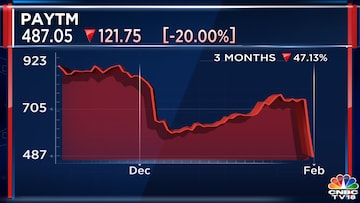Samir Arora, Founder and Fund Manager of Helios Capital, in an interview with CNBC-TV18, discussed concerns surrounding Paytm Payments Bank. "I don’t think it’s a corporate governance issue. Of course, it's an issue, and for that, even we are not sure what we will do," he said.
Arora also shared his perspective on the Reserve Bank of India's (RBI) involvement, suggesting that while payment bank might be under regulation, the fintech part of the business may not be. He believes that separating these two aspects could help manage the situation. "In general, what I understood is that this has more to do with the fact that Paytm Bank is supposed to be an independent entity with independent management, and independent control," he noted.
He also explained why it cannot be termed a corporate governance issue. Corporate governance, he noted, means somebody's trying to defraud somebody, such as the top management trying to take advantage of minority shareholders. In Paytm Payments Bank case, that is not true. "There might be an issue, it's not a fraud, corporate governance looks a bit higher version than this," he said, adding that corporate governance issue should not be used so loosely.
Also Read
On January 31, RBI directed Paytm Payments Bank to stop deposits or credit transactions or top-ups in any customer accounts, prepaid instruments, wallets, FASTags, NCMC cards, etc., after February 29, other than any interest, cashback, or refunds which may be credited anytime.
The central bank said that the comprehensive system audit report and thereafter the compliance validation report of the external auditors revealed persistent non-compliance on PPBL's part. The continued material supervisory concerns in the bank warrant further supervisory action, RBI said in a statement.
The RBI directives does not impact user deposits in their savings accounts, wallets, FASTags, and NCMC accounts, where the existing balances can be used.
Paytm founder Vijay Shekhar Sharma held an analyst call on February 1 post the Reserve Bank of India's actions on Paytm Payments Bank during which he called the move a "speed bump," and added that with partnerships with other banks, the company will "see this through the next few days or quarters."
Multiple brokerages have downgraded the stock over the past couple of days, and cut their target prices. Out of the 15 analysts that have coverage on Paytm, four of them now have a "sell" rating, while seven continue to maintain a "buy" recommendation.
"The order materially impacts Paytm's core payments business impacting payment revenue growth and net payment margins," JPMorgan wrote in its note.
Paytm's parent One97 Communications expects a "
worst case impact" of ₹300 crore to ₹500 crore on its annual earnings before interest, tax, depreciation and amortisation (EBITDA) following the RBI's latest action against Paytm Payments Bank.
For more details, watch the accompanying video
(Edited by : Shweta Mungre)
First Published: Feb 2, 2024 4:23 PM IST




